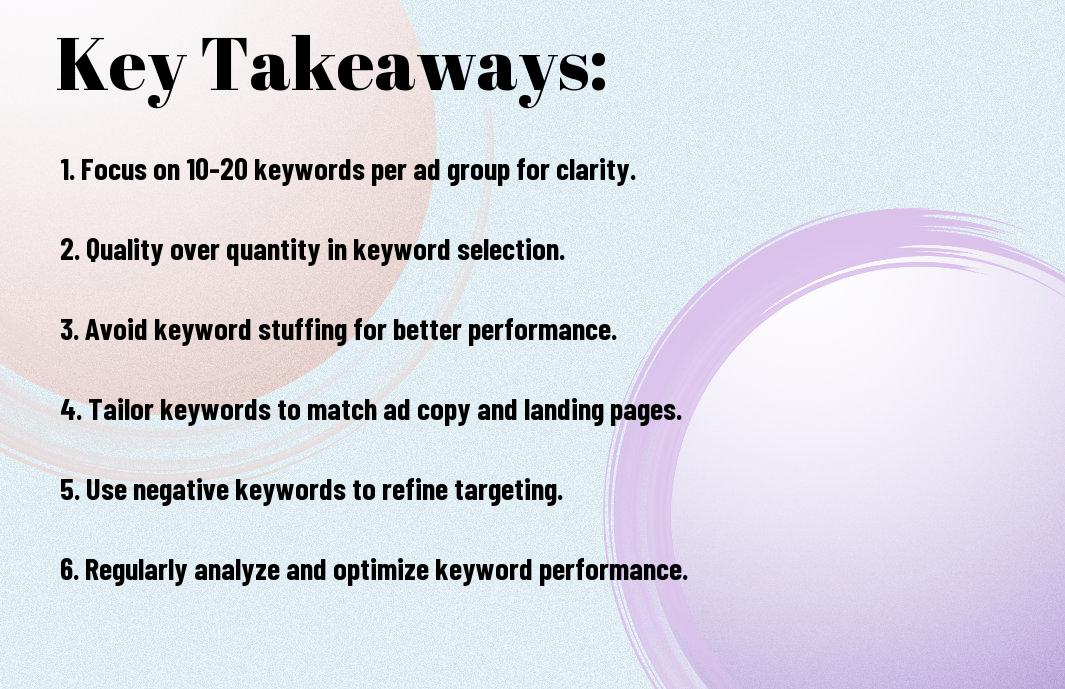With the ever-evolving landscape of pay-per-click (PPC) advertising, it’s crucial to strategize your keyword selection effectively. The ideal number of keywords per ad group can significantly impact the success of your campaigns. Having too few keywords could limit your reach, while overloading your ad groups with too many keywords can dilute the focus and hinder performance. In this blog post, we examine into the optimal number of keywords per ad group in PPC to help you achieve maximum ROI and improve your advertising efforts.
Key Takeaways:
- Focus on relevance: Having a small number of highly relevant keywords in each ad group can improve ad performance by ensuring that the ad copy matches the search query closely.
- Aim for 5-20 keywords: It is generally recommended to have between 5 to 20 keywords per ad group to maintain focus and relevancy without making them too broad or too narrow.
- Regularly review and optimize: Continuously monitor the performance of your keywords and ad groups, and make adjustments as needed to improve campaign effectiveness and ROI.
Understanding Ad Group Structure
Even though there are no strict rules on the exact number of keywords to include in an ad group, understanding the ad group structure is crucial for a successful PPC campaign. For more insights on this topic, check out How many Keywords per Ad Group.
Significance of Relevance in Ad Groups
Relevance is the cornerstone of an effective ad group structure. Ensuring that your keywords, ad copy, and landing page are all relevant to each other increases the chances of a high Quality Score. A high Quality Score can lead to lower costs and better ad positions, ultimately improving your campaign’s performance.
Balancing Quantity and Quality of Keywords
For a well-structured ad group, it is crucial to strike a balance between the quantity and quality of keywords. Having a few highly relevant keywords can be more effective than having a large number of generic keywords. Additionally, focusing on long-tail keywords can help target a more specific audience and improve the overall quality of your traffic.
Determining the Ideal Number of Keywords
Factors Influencing Keyword Counts
You must consider various factors when determining the number of keywords to include in your ad group. Main keywords play a crucial role in relevancy and ad performance. However, other factors such as campaign goals, budget constraints, and the level of specificity in targeting also influence keyword counts. This requires a careful balance to ensure optimal performance.
- Main keywords are important for ad relevancy
- Campaign goals and budget constraints impact keyword counts
- Level of specificity in targeting influences keyword selection
This complexity makes it crucial to analyze and adjust your keyword count regularly to optimize performance. This will ensure your ad groups are focused, relevant, and efficient.
Recommended Range for Keyword Quantity
On average, ad groups should have between 5 to 20 keywords to maintain relevance and performance. Counts fewer than 5 can limit targeting options, while exceeding 20 can dilute ad relevance and impact Quality Score. Strike a balance between broad and specific keywords to reach your target audience effectively. Regularly monitor and optimize your keyword list to ensure optimal performance and relevance.
Best Practices for Managing Keywords
Keyword Match Types and Their Impact
Not all keywords are created equal in the world of PPC advertising. Understanding the different match types and how they impact your ad performance is crucial for success. By using exact match, phrase match, and broad match keywords strategically, you can control when and where your ads show up, ensuring they are seen by the right audience. This targeted approach can lead to higher click-through rates and better overall campaign performance.
| Match Type | Impact |
| Exact Match | Precise targeting, lower search volume |
| Phrase Match | Mid-level targeting, moderate search volume |
| Broad Match | Wider targeting, higher search volume |
| Modified Broad Match | Controlled targeting, varied search volume |
| Negative Keywords | Exclude unwanted searches, improve relevance |
Continuous Keyword Performance Evaluation
Matching your keywords to search queries is an ongoing process that requires regular monitoring and adjustments. By regularly analyzing your keyword performance, you can identify opportunities for optimization and refinement. This data-driven approach allows you to allocate your budget more effectively, improving ROI over time.
Practices like conducting A/B testing, monitoring click-through rates, and adjusting bids based on performance can help you stay ahead of the competition. By staying proactive in your keyword management, you can continuously improve the relevance and effectiveness of your ads, ultimately driving better results for your campaigns.

Advanced Strategies for Keyword Optimization
-
Using Negative Keywords Effectively
What To Do What to Avoid Regularly review search terms report Avoid using broad match negatives excessively Add negative keywords to block irrelevant searches Avoid adding negative keywords without analyzing performance Use negative keywords to improve CTR and reduce wasted spend Avoid relying solely on broad match negatives Keywords are crucial in PPC campaigns, but negative keywords play an equally important role. By effectively utilizing negative keywords, you can optimize your ad groups for better targeting, improve your CTR, and reduce wasted spend. Regularly review your search terms report to identify irrelevant terms to add as negative keywords and avoid using broad match negatives excessively.
-
The Role of Long-Tail Keywords in Ad Groups
With the rise of voice search and the increasing complexity of search queries, long-tail keywords have become necessary in PPC ad groups. These keywords are more specific and targeted, allowing you to reach a highly relevant audience. They often have lower competition and cost, making them an excellent opportunity to boost your campaign performance. Incorporating long-tail keywords strategically can help drive qualified traffic and improve your conversion rates.


Summing up
Now that you have learned about the importance of keywords in PPC ad groups, remember that there is no one-size-fits-all answer to how many keywords you should have. It is advisable to start with a manageable number of targeted keywords per ad group, usually between 5 to 20, to ensure relevance and improved ad performance. Regularly monitoring and optimizing your keyword selection based on performance data will help you achieve better results in your PPC campaigns.
FAQ
Q: How many keywords should I have per ad group in PPC?
A: It is recommended to have 10-20 keywords per ad group in your PPC campaign. This allows for better organization, relevance, and control over your ad group performance. Having too many keywords can dilute the effectiveness of your ads, while having too few can restrict your reach.
Q: What is the importance of having the right number of keywords per ad group?
A: Having the right number of keywords per ad group is crucial for maintaining a high Quality Score in PPC. By grouping relevant keywords together, you can create targeted ad copy, improve ad relevance, and increase click-through rates. This approach also allows for better budget management and optimization of your campaign performance.
How can I determine the optimal number of keywords for my ad groups?
A: To determine the optimal number of keywords for your ad groups, start by conducting keyword research to identify relevant terms related to your products or services. Group similar keywords together based on themes or intent. Test different combinations of keywords in your ad groups and monitor their performance. Through continuous testing and optimization, you can refine your keyword strategy and find the right balance for each ad group in your PPC campaign.



